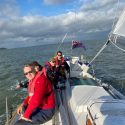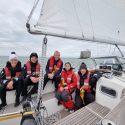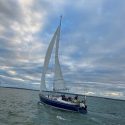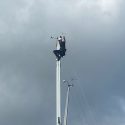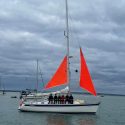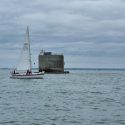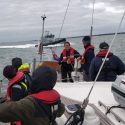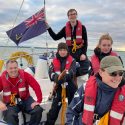Junior Rates and Junior Officers are reservists who are relatively new to the service, and who are therefore more likely to benefit from additional sailing experience not only for their personal development as a maritime reservist but also to better prepare them for any future operational role they may have at sea. Sailing onboard a yacht brings a different perspective to sailing onboard a warship, and yet both require the same skills, techniques and knowledge about seamanship, boat handling, navigation, Rule of the Road, and drills such as anchorages and man overboard drills. These skills were all practiced and tested over the 3-day exercise, with the 34 ft yachts being the perfect small-scale platform for individuals to get hands-on with all the drills. For AB Amelia Hughes this was her first time sailing on a yacht, and she expressed that it was ‘very useful to put my professional RN skills into use in order to test my knowledge and push myself to apply them to unfamiliar situations’.
Of course, in addition to novices, there was a requirement for experienced skippers to lead each crew through the exercises. These skippers were tested in a different way, by being given a leadership position not only in crewing the yachts but in ensuring their crew, literally, ‘learnt the ropes’ in the most productive way possible. This was particularly relevant on day 1 of the exercise, where crews were tasked with familiarising themselves with the yachts and carrying out key drills such as slipping and coming alongside, mooring at a buoy, man overboard drills, and hoisting the sails. In order to ensure that the learning experience extended to these skippers, sailing instructors took part in the exercise to teach and challenge them further. One skipper stated that learning from the experience of these instructors ‘was very beneficial to my personal development’.
Day 2 of the exercise required a little more theory, with passage planning and pilotage planning needed to sail from Gosport and come alongside in Cowes on the Isle of Wight. In addition to this, the more experienced crews were tasked with navigating to and around Nab tower, in the eastern mouth of the entrance to the Solent. The less experienced crews were tasked with navigating up the Beaulieu River. And all crews were tasked with an anchorage in sheltered waters for lunch. As a reward for the hard work of crews, everyone gathered at the Island Sailing Club in Cowes in the evening for a fantastic BBQ and chance to socialise with reservists from other units from across the country. Many participants expressed their appreciation for the social aspect of the weekend, such as one who said he ‘really enjoyed the fact that I was able to catch up with people from across the RNR that I wouldn’t otherwise get to see’.
AB Hughes was one reservist who expressed that she will ‘definitely be doing more SAILEXs in the future’ and will ‘strongly encourage other people to give them a go’. In fact, these sentiments were shared with 100% of the 31 participants who responded to a post-exercise survey, who all agreed that they are ‘very likely to attend a National RNR SAILEX again’ and are ‘very likely to recommend the SAILEX to a colleague’. Other highlights from participants that were gathered through this survey include the opportunity ‘to get to sea and get comfortable with key maritime skills in a fun and active environment’, and to ‘learn the basics of sailing having previously not known anything’. Participants appreciated the ‘balance from novices to experts’, and the chance to ‘bond with people who I didn’t know before’. In areas for improvement, multiple participants expressed their desire to go further, for longer, and to have more frequent similar opportunities in the future. The future of the National RNR SAILEX is therefore looking bright.
It is no news for anybody that for the majority of 2020 and 2021, the ability to partake in any form of group activity has been extremely limited. This, of course, extended to AT with the Reserve Forces, with all AT being justifiably cancelled or postponed throughout the worst of the COVID-19 pandemic. The chance, therefore, to get back to it, to get together in a group, and to be active and adventurous is something to be celebrated even more than it usually should be. Because of this, we are extremely grateful for the Ulysses Trust and the support they provided in ensuring that the National RNR SAILEX could go ahead this year. The grant provided was crucial in restarting this aspect of AT after the pandemic, and the success of the exercise has meant that plans for another SAILEX next year are already being initiated.
Click on the images below to see a larger slideshow version

